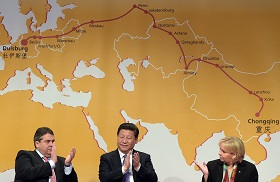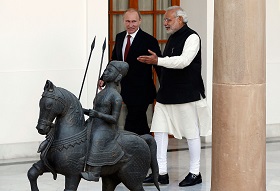The meeting of Russian, Indian and Chinese foreign ministers in Beijing early February seems to have been of much greater significance than most of their previous meetings. As a matter of fact, it took place almost immediately after President Obama’s trip to India, where he was the Chief Guest at the traditional January 26 parade to mark Republic Day (NB, President Putin was the first foreign Chief Guest back in 2007).
The meeting of Russian, Indian and Chinese foreign ministers in Beijing early February seems to have been of much greater significance than most of their previous meetings. As a matter of fact, it took place almost immediately after President Obama’s trip to India, where he was the Chief Guest at the traditional January 26 parade to mark Republic Day (NB, President Putin was the first foreign Chief Guest back in 2007). President Obama’s visit saw vigorous bilateral attempts to upgrade the U.S.-Indian relationship, open the way for American corporations to build nuclear power stations in India and significantly expand military-technical cooperation. Many observers perceived Obama's stopover as a tentative inroad into key areas of the Russian-Indian partnership and as an attempt to demonstrate America’s interest in India given China’s growing economic and military might.
Therefore, the trilateral meeting turned out to be somewhat helpful for all parties. India has shown that, although Obama was given a warm welcome, Delhi is not about to depart from its principle of balanced relations with all key partners. India’s External Affairs Minister Sushma Swaraj did her best to dispel suspicions of an anti-China bias in India’s foreign policy and to underline the importance of Indian-Russian ties.
China used the gathering to reaffirm its leading global role and ensure the country enjoys intensive and versatile external contacts. Foreign Minster Wang Yi, as host, spared no efforts to raise the Beijing talks’ prestige.
China sought to stress the significance of its relations with India and seems to have arranged the announcement about Prime Minister Narendra Modi’s official return visit to the PRC next May to be made during the foreign ministers’ meeting.
The talks were also of major importance for Russia. Under unrelenting Western pressure over Ukraine, Moscow has indicated that it has true, reliable friends and partners in the East, without attempting to use them for an anti-West alliance. In his addresses and at the final press conference, Foreign Minister Sergey Lavrov emphasized all three countries’ willingness to set up a democratic and fair polycentric world order led and harmonized by the United Nations.
Lavrov attached special attention to Russia’s role in settling the situation in Syria, a country torn apart by a brutal conflict that has taken more than 200,000 lives. He also briefed his counterparts about the January 26-29 talks between the Syrian opposition and Damascus in Moscow, stressing at the press conference that it is hard to exaggerate the importance of such preparatory meetings.
The parties are seeking to expand attendance on the basis of the principles voiced by Director of the RAS Institute for Oriental Studies and RIAC Member Vitaly Naumkin, who mediated at the meetings and proposed widening the area of accord between the opposition and the government. Notably, participants of the Beijing event differ over the Syria crisis, since both China and India remain deeply concerned about the Islamic State’s barbarity and the threat of a proliferating Islamic jihad. Even Washington gave a positive response to the Moscow negotiations, as it seems to have realized that regime change in Damascus will only strengthen the Islamists and aggravate the threat already posed by the expanding movement.
The Beijing meeting of Russian, Chinese and Indian foreign ministers once again proved the need for a variety of non-antagonistic approaches to global interaction. Russia and China supported India’s aspirations to join APEC, and BRICS definitely retains its role alongside the Russia-China-India trilateral format. Both Russia and China would also like to see India become a full member of the Shanghai Cooperation Organization.
The next ministerial meeting will be held in Russia in the second half of 2015.






